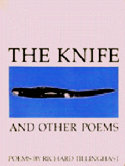
Review written by Bruce Bennett
The Knife and Other Poems by Richard Tillinghast. 63 pp. Middletown, Conn.: Wesleyan University Press. Cloth, $10. Paper, $4.95.
Richard Tillinghast's "The Knife and Other Poems" is a haunted book. Ghosts of all sorts abound in its pages: visions of lost love, images of the poet's former self, the presence—and sometimes the worlds—of earlier poets, as in the poems "after" Baudelaire, Mallarmé, Rilke. Faces stare out of old photographs; snatches of song—Janis Joplin, Dylan—drift in from what is already a vanished era. The theme of return, introduced in the first poem, recurs throughout the volume; but its burden is that the longing is futile: You can't go home again. And, not surprisingly, counterpoint appears in the theme of leave-taking. There is even a literal act of conjuring in "Lost Cove & The Rose of San Antone," where the poet, meditating over his bourbon in California, dreams up a man drinking in Lost Cove, Tenn., in 1938, and then must lock his door in fear as his creation stalks him.
The poet speaks again and again of "things past," "things I could never get back." Rain falls constantly and is identified as his "favorite weather." Longed-for events, when they occur, prove insubstantial. He is troubled by glimpses of himself as he was three years ago, ten years ago; by his realization that shared ideals, high expectations, have come to nothing. He and "old friends from summers past" "drink old whiskey and talk about ghosts," recognizing the onset of age as they look at each other's children and see—but don't acknowledge—in one another "the tired look around the eyes, / the flesh a little loose on the jaw. . . ." Malaise permeates every interior, while outside "the rain comes down, comes down, comes down."
Yet the gloom is not unrelieved. There's an exhilarating lucidity in the language, a freshness in the form of these poems that qualifies their somber message. And, at the end, there's a kind of escape: The poet drives "out over the Golden Gate / and the spirits of all the dead . . . into the redwoods and foothills, into the open darkness." More important, earlier, in the magnificent title poem, the knife he "almost lost" 20 years before in the "depths of Spring River" is miraculously recovered in an act which affirms the possibility of transcendence:
and now I see
David burst into the upper air
gasping as he brings to the surface our grandfather's knife
shaped now, for as long as these words last,
like all things saved from time. I see in its steel
the worn gold on my father's hand
the light in those trees
the look on my son's face a moment old
like the river old like rain
older than anything that dies can be.
Bruce Bennett, a poet, teaches at Wells College. This review appeared in the May 10, 1981 issue of The New York Times Book Review. Copyright by The New York Times